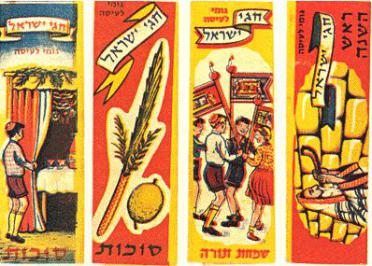Every week, parshaoftheweek.com brings you a rich selection of material on parshat hashavua, the weekly portion traditionally read in synagogues all over the world. Using both classic and contemporary material, we take a look at these portions in a fresh way, relating them to both ancient Jewish concerns as well as cutting-edge modern issues and topics. We also bring you material on the Jewish holidays, as well as insights into life cycle rituals and events...
I'd like to share a thought with you all about the Seder. As many of you already know, the asking of questions is a central element of the Passover Seder. Traditionally, the youngest children at the meal ask the four questions. Prompted by the strangeness of the Seder table - matza instead of challah, weird vegetables and dips, way too much wine, pillows at everyone's seat - the children ask the adults what it's all about, and get answers. This dynamic is seen as classically and crucially Jewish: we must pay attention, things must be noticed, questions must be asked, answers are demanded, and we must try to supply them, as best we can.
The Talmud in the tractate Pesachim, which is our basic source for the laws and customs of the Seder, contains a strange halacha (law). What if there are no children present at the Seder? What if it is a Seder attended only by knowledgeable adults? Must the questions still be asked? The Talmud says yes: the classic Jewish dynamic of asking and answering must be preserved. Well, OK, but what if it is a one-man Seder? What if someone is making the Seder on his or her own, what then? The Talmud insists that even in this case, the lone Seder-maker must ask himself the four questions, and then answer them.
Now, one could explain this law by pointing out that this strange monologue does serve to keep the tradition of question and response alive, even though it would seem to lack the true dynamic of a real question and answer - after all, if you know the answers, what kind of questions are you asking yourself? But, I have a different, hopefully more satisfying, explanation. Some months ago, I was given a gift by some of my students: a bumper sticker that reads "Don't Believe Everything You Think". Pondering this message as I hide in my office during the final, crucial, critical hours of Pessach cleaning, it occurs to me that the law which demands that the solo Seder-maker ask himself the questions is NOT simply a formal nod to the importance of the question/answer format. Rather, it may well be teaching us what the deepest, hardest, most important Jewish question is.
You see, telling your four-year-old son or granddaughter the story of the Exodus is a pleasure, a piece of Kosher for Passover cake (and my wife makes a Passover apple cake that you can not believe is Kosher for Pessach, but I digress). Challenging yoursel
Chag Sameach,
Rabbi Shimon Felix



Get inspired by Pesach Divrei Torah from previous years